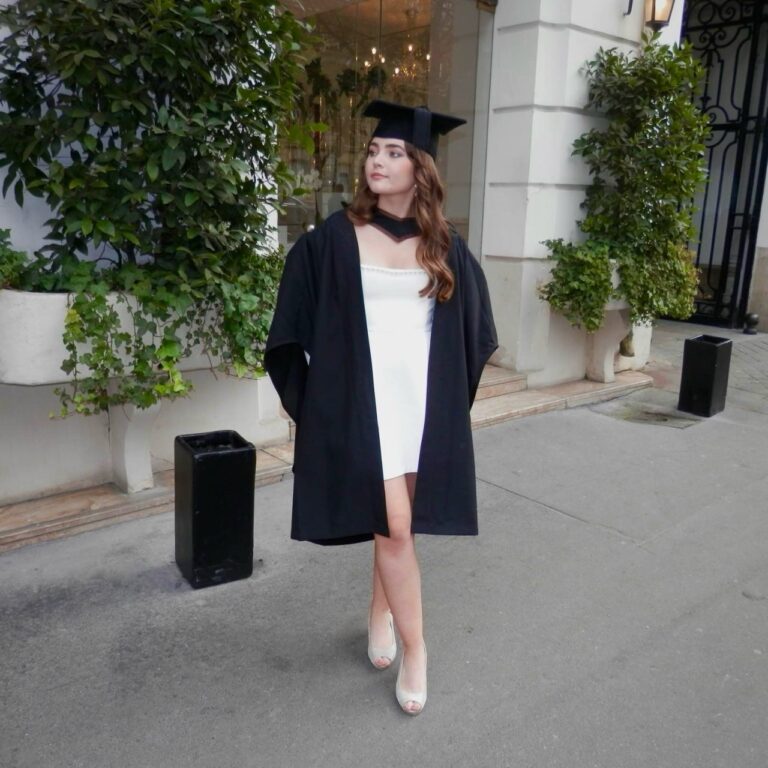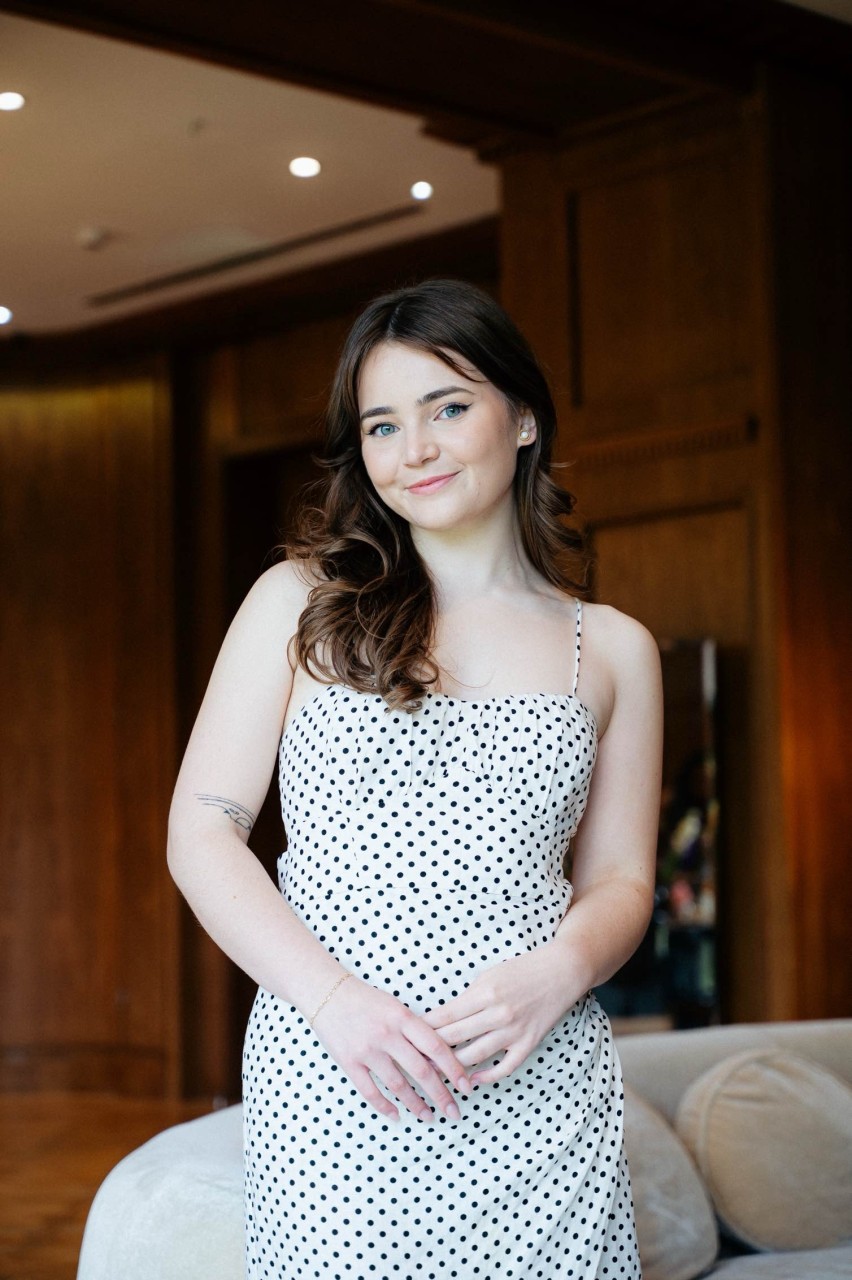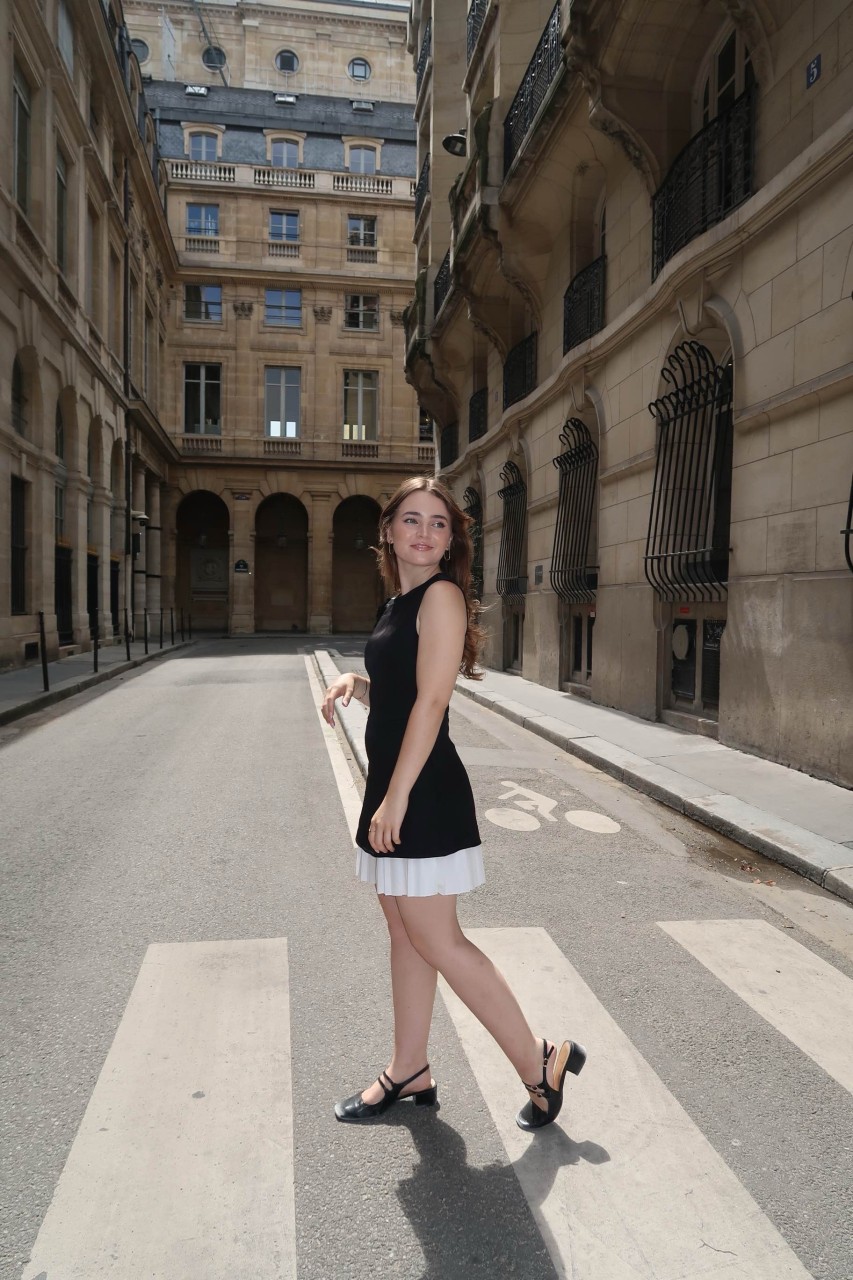
If you’ve ever dreamed of studying or working in Paris, Amelia (Mimi) Fry’s story makes it feel possible. Born and raised in Wolverhampton, UK, she now lives in the heart of France’s capital, balancing her studies and career with ease, much like a real-life “Emily in Paris.”
Mimi’s love affair with France didn’t start with Paris, but with childhood vacations to Saint-Malo and Normandy. “We never went to Paris because it was super expensive,” she says.
Yet, her father’s interest in French culture — and even making her watch French children TV shows — planted the seed. “I was around 14 when I started becoming really interested in France,” she says.
Determined to visit Paris, Mimi made a deal with her mother: if she scored 100% on her French exam, they would go to the city. And she did. “I was 16, and I remember being on that Paris trip thinking, ‘Oh my God, I’m going to move here in two years,” she says.
After finishing her A Levels in the UK, Mimi applied but failed to get into the University of Birmingham’s linguistics. It was a blessing as the University of London Institute in Paris would later offer her a spot in their BA in French Studies for her good grades.
Mimi doesn’t have any plans to return home soon.
“Honestly, I knew I was never going back to England,” she says. “The lifestyle is just completely different. I didn’t get along with a lot of people, and I always felt like a bit of an outsider because none of my friends shared the same interests as me.”
Now, Mimi hopes to guide others who dream of moving to Paris with five essential tips for studying or working in the city.

For Mimi, les bises, the double cheek kiss, still feels awkward. She sometimes forgets, which can seem rude, and it feels too close for her very British sensibilities. Source: Amelia (Mimi) Fry
1. Adapting to Parisian culture
Coming from England, Mimi was used to fake tans, nose piercings, bright colours, and lots of makeup.
These felt out of place in Paris. People on the street would even comment that she looked “weird.” Over time, she adopted more natural beauty routines and more minimalist clothing. Even clubbing outfits that she once considered normal in England now feel excessive to her.
“I couldn’t even imagine doing that now,” she says. “I feel like I’ve been Frenchified.”
She also noticed that the French are very direct. What tourists often perceive as rudeness is, in fact, straightforwardness. “In contrast, British people are very polite but rarely say exactly what they’re thinking,” she says. “French people, on the other hand, will tell you directly what’s on their mind. And honestly, I’ve come to prefer that now.”
Cultural differences extended to work life as well. At first, she felt guilty taking coffee breaks or long lunches. “I believed I had to be chained to my desk at all times, so I would only take a 30-minute lunch break instead of the usual two hours,” Mimi says.
But in France, people will happily take two or even three-hour lunches. If you don’t join, it comes across as antisocial.

One way Mimi saved money was by not drinking. In her first year, she went out, but gradually stopped as she found that French people aren’t big drinkers. Source: Amelia (Mimi) Fry
2. Living in Paris on a student budget
Like many newcomers, Mimi was surprised at the true cost of living in Paris.
Rent can vary widely depending on whether you live alone or with roommates. Many of her friends began as au pairs, young people from other countries who live with a host family to help with childcare and light household tasks. In exchange, they receive free accommodation, meals, and sometimes a small allowance, while getting a chance to experience Parisian life and culture.
Mimi never took that route. Instead, she rented an 11-square-meter basement apartment near the Eiffel Tower for 700 euros a month.
But food in Paris is affordable — if you know where to shop, like the ALDI supermarket chain. “If you go to a more upscale supermarket, prices obviously seem higher,” she says. “But compared to the UK, eating in Paris is cheaper.”
Transportation is another advantage for students. A yearly card costs around 360 euros and allows unlimited travel across the Île-de-France region. This makes short trips to Champagne or nearby towns easy and budget-friendly.
Mimi’s budgeting strategies focus on lifestyle choices. She avoids bars and alcohol, which saves a lot. Instead, she enjoys free or low-cost activities, such as picnics, museums, parks, and taking advantage of student discounts at restaurants.
Chains like Crous Paris and Bouillon Chartier offer meals for four to 15 euros, while L’Everest bar provides drinks for around 3.50 euros, keeping social life affordable.

Most of Mimi’s professional connections have come through social media or past job experience. While social media makes meeting people easy, it still requires putting yourself out there. Source: Amelia (Mimi) Fry
3. Building connections in Paris
For Mimi, building a professional network in Paris happened naturally through exhibitions, casual meetups, and, most of all, social media.
Platforms like LinkedIn, Instagram, and TikTok have played a much bigger role than traditional networking sessions. TikTok, in particular, has opened unexpected doors.
“For example, I work for an app called Le Walk, which offers guided audio tours around Paris using GPS,” she says. “They actually found me on TikTok, and now I work for them. In just six months, we’ve grown from 0 to almost 100,000 followers on Instagram.”
Through this work, Mimi also connected with a vast network in social media marketing, thanks to the CEO’s past experience at TikTok in New York. She has also built a portfolio as a UGC creator, partnering with many brands and saving every contact for when she launches her agency, Muse Social, in January 2026.
Most connections have come through social media or previous jobs. “When I moved to Paris, I was always searching for people creating content I liked or doing similar work, and I would message them to ask if they wanted to meet for a coffee,” Mimi says.

The only thing that feels strange for Mimi is the smoking. Since many social breaks revolve around cigarettes, she sometimes misses out on casual interactions as a non-smoker. Source: Amelia (Mimi) Fry
4. Cracking the code of Paris work life
Speaking fluent French made a big difference from the start. It helped her feel accepted, and unlike the TV version of “Emily in Paris,” she never felt excluded for being English. Her coworkers have always been welcoming and kind.
But even though she was comfortable with the language, it was a challenge to speak only French every day. It took her about two months to feel fully integrated. “Over time, it got easier to speak French all day,” Mimi says. “But sometimes, by the end of the week, I’d realise, ‘Oh my God, I haven’t spoken English all week,’ and I’d forget words in English, which is so embarrassing.”
One etiquette tip she stresses for foreigners is the importance of politeness. “When I go into the office, I always say ‘bonjour’ to everyone, and at lunchtime, you’re expected to say ‘bon appétit’ to everyone as well,” she says. “At first, it felt kind of weird because I didn’t understand why we had to say it. Even if I were getting a cup of tea or chewing gum at exactly midday, everyone would say ‘bon appétit’.”
Now, these are part of her daily routine.

Looking ahead, Mimi aims to launch her own social media marketing agency in Paris, helping brands grow with authentic, creative, and performance-driven strategies. Source: Amelia (Mimi) Fry
5. Exploring Paris without the stress
Getting around Paris can feel overwhelming at first, but the city is surprisingly compact. Mimi enjoys walking since most places are within reach, and the longest trip across town is usually no more than an hour and a half.
While many residents rely on the metro, some lines can be crowded, so it helps to choose routes carefully. Public bikes are another affordable and convenient way to move through the city, especially now that scooters are no longer available.
For those exploring landmarks, it’s worth checking for discounts. “The Eiffel Tower offers discounted ticket rates for young people aged 12 to 24, which can be considered a student discount,” she says.
To avoid tourist traps, Mimi believes the key lies in building connections. Locals know the hidden gems, and she encourages newcomers to branch out. Having lived in Paris for nearly four years, she often receives messages on TikTok or Instagram from people who have just moved to the city, asking to meet for coffee.
“I love meeting new people, so I usually say yes,” she says. “We’ll often have a two-hour conversation, and they end up learning a lot about the city.”
Her advice is simple. “Make friends with people who are already living in Paris,” she says. “Don’t just stick to the group you came with. It’s easy to stay in that bubble, but connecting with locals makes everything so much easier.”










